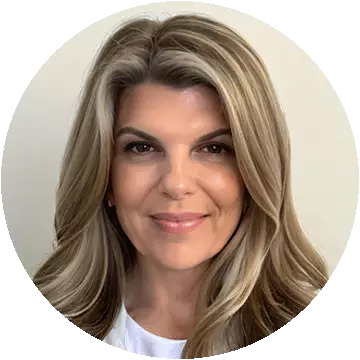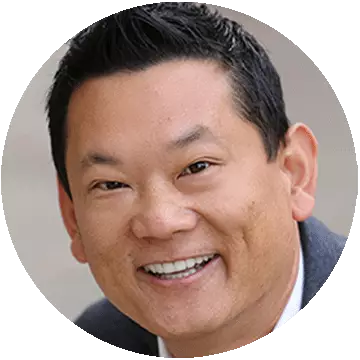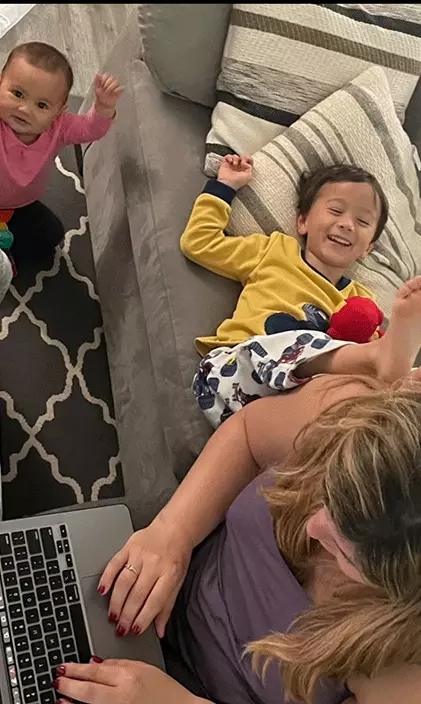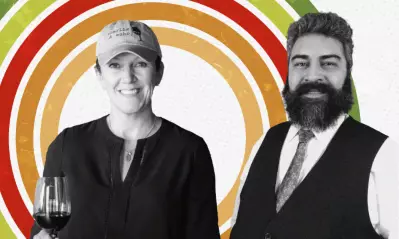Open to opportunity
Lisa Lea, DNP, FNP-C, BCMAS, currently serves as the director of Medical Affairs, Patient Insights at the biopharmaceutical company Merck . It’s a challenging role, one that draws on her nursing experience, her intellectual curiosity and her drive to improve patient experiences and outcomes.
Strange then to think how, once upon a time, she wanted to be an advertising executive.
“As I was going through my education, I realized that I was in love with the lifestyle of an advertising executive, not the job,” she says with a laugh and a nod to Mad Men.
It wasn’t until college, when she had to see a physician for a medical issue, that she course-corrected. Her regular doctor was on sabbatical, and she saw a nurse practitioner (NP) instead.
The experience was transformative. Lea had grudgingly agreed to see the NP since she couldn’t wait months for her physician. But when the NP met with her, Lea was impressed by the time and care she received. So much so that Lea began to see her regularly.

Lisa Lea, DNP, FNP-C, BCMAS
Director of Medical Affairs, Patient Insights, Merck
She also changed her own professional plans. “I said, ‘This is what I want to do,’” Lea recalls. “I just completely pivoted. I started taking nursing classes and decided to go to nursing school with the intention of being an NP.”
This was the beginning of a pattern for Lea, one in which keeping an open mind would lead to unexpected opportunities.
Finding her future in pharma
After completing her nurse practitioner degree, Lea was ready to begin her career. She thought she’d go into diabetes management. She loved the challenge of working with chronic diseases, in part because it allowed her to get to know her patients on a deeper level.
Opportunity, however, came from a different direction. She answered a classified ad for a pulmonary hypertension program coordinator and fell in love with the job. Gradually, she developed expertise in pulmonary arterial hypertension (PAH), which is essentially high blood pressure in the lungs.
Lea was happy in her clinical role. Pharmaceutical representatives occasionally approached her about switching to the industry side of things, but she declined again and again.
“The third time that the job came available, I said, ‘I think the universe is trying to tell me I should at least consider it,’” Lea says with her trademark humor.
She went to the interview and realized how her biases had perhaps kept her closed off from new opportunities. “I just said, ‘Oh my goodness, these are my people!’” Lea recalls. “There’s a perception about clinicians who move over into pharma, like you’ve sold out, you’ve gone to the dark side, that kind of thing. … After a while, I said, ‘Actually, I feel like it’s the light side.”
Lea cites the robust scientific community and the strict safety regulations as examples of why she loves working in biotech. The work-life balance doesn’t hurt, either.
Earning her doctorate; breaking barriers
Over the years, Lea worked for a number of biotech companies, eventually moving from her home state of Oregon to California’s Bay Area. She and her husband, Tom Chu, started a family, and life was good.
She appreciated the impact she was able to make in the lives of patients by working in pharmaceuticals. Less appreciable was the ceiling she’d reached in her career. She wanted to move into medical affairs, and she felt she needed a terminal degree.
After she’d been turned down for a job for that reason, she called Chu to commiserate. “He was like, ‘Why don’t you just get it?’” Lea recalls.

Tom Chu, MBA
“I emphasized to Lisa that there was no better moment to pursue her DNP,” Chu says. “By obtaining her doctorate, she’d eliminate any potential excuses from companies suggesting her lack of a doctorate was a reason for rejection.”
Chu did more than offer encouraging words. Having graduated from University of Phoenix with his MBA , he found UOPX’s online Doctor of Nursing Practice program
for his wife. He told her to go start the application process; he’d take care of the kids.
“I have to thank him for that because I would still be talking about it if he hadn’t done that,” Lea says.
Today, she sits in a home office that looks like a virtual background. Everything is neutral, beautiful and feng shui’ed into tranquility. It is a setting whose subtext speaks to a level of competence and capability, which makes the trepidation she felt about pursuing her doctorate especially revealing.
Lea recalls: “My good friend who just finished her DNP, like a year before me, said, ‘How come you didn’t tell me you were in your DNP program?’
“And I said, ‘Because I’m afraid I’m not going to finish! I don’t want to have to tell people I started and didn’t finish.’
“And she said, ‘Honey, at this age, we don’t call it not finishing. We call it taking a break.’”
Chu, meanwhile, never had a doubt. “I’ve always known Lisa to be incredibly determined,” he says. “Once she sets her mind and focus on something, nothing can stand in her way. She simply needed to hear that reassurance aloud.”
Lea buckled down and was pleasantly surprised by the UOPX program. Where she’d juggled clinical hours and studying with full-time work during her nurse practitioner training, she had more control over her schedule in the doctoral program. (Working from home during that stage of her life helped too.)

What complicated things was her commitment to her growing family. Now 6 and 3, her son and daughter were even younger when she started the program, and she refused to prioritize anything over them.
“My viewpoint with kids is they’re only little for a short period of time, and I don’t want to steal any more time from them than is absolutely necessary,” she says. “So, all throughout school, I worked very hard to get everything done before they got home from school.”
That meant keeping East Coast hours for work, focusing on school some afternoons and making the most of the occasional transatlantic plane ride to crank out a paper.
Merck supported Lea in her efforts. Not only was tuition assistance available but her colleagues encouraged her as well.
Lea returned this support by sharing what her doctoral research revealed regarding diversity and inclusion in clinical trials. “We have a great nurse network within our organization,” she says, admitting that she loves to recruit nurses since they have strong medical and communication skills. “So, I presented [my research] to the nurse network, and it was an inspiration. Like, ‘Look! Nurses can do research too.’”
On Oct. 7, 2023, the work, the worry and the intellectual breakthroughs paid off. She attended her commencement ceremony in Anaheim, California.
Cheering her on was her now 97-year-old father, a periodontist who’d long encouraged his daughter to earn her doctorate. “I always wanted to finish it, and there was part of me that wanted him to see me finish it because it was important to him,” she says.
Open mind, open future
Today, Lea describes her role as a liaison between patients and corporation. “My job is to make sure that we … incorporate the patient voice into everything we do,” she says. “I always say that I feel very lucky that I still get to work with patients, but I don’t have to chart anymore!”
Just as keeping an open mind led Lea down a path she couldn’t have predicted in her youth, she encourages others to do the same in their own lives. From her full-time role at Merck to her side hustle (she provides Botox injections as an aesthetician), she encourages young people, as well as working nurses considering a career switch, to stay open to possibilities.
“You never know where life’s going to take you,” she says, “but it’s an incredible journey.”
Meet Phoenixes like Lisa. Make connections, build relationships and be part of a growing community. Join a chapter .
Find out if your employer is one of the more than 1,500 organizations University of Phoenix works with to offer education benefits .

ABOUT THE AUTHOR
Elizabeth Exline has been telling stories ever since she won a writing contest in third grade. She's covered design and architecture, travel, lifestyle content and a host of other topics for national, regional, local and brand publications. Additionally, she's worked in content development for Marriott International and manuscript development for a variety of authors.

ABOUT THE REVIEWER
Dr. Raelene Brooks, dean of the College of Nursing, has been a registered nurse for more than 25 years and practiced extensively in the areas of ICU, trauma and critical care. Her publications include a focus on nursing education, critical care and diversity, equity and inclusion. She is a leader in creating, guiding and launching innovative curriculum.
This article has been vetted by University of Phoenix's editorial advisory committee.
Read more about our editorial process.
Read more articles like this:




